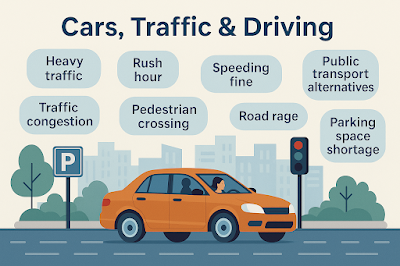✦ IELTS Topic: Cars, Traffic & Driving – 10 Useful Phrases
-
Heavy traffic
e.g., We were stuck in heavy traffic for over an hour. -
Rush hour
e.g., I try to avoid driving during rush hour whenever possible. -
Traffic congestion
e.g., Traffic congestion is a major problem in the city centre. -
Pedestrian crossing
e.g., Drivers must stop at the pedestrian crossing for people to cross safely. -
Speeding fine
e.g., He got a speeding fine for going 20 km/h over the limit. -
Driver’s licence
e.g., You can’t rent a car unless you have a valid driver’s licence. -
Public transport alternatives
e.g., More people would leave their cars at home if there were better public transport alternatives. -
Road rage
e.g., Road rage incidents have increased due to poor driving habits. -
Fuel-efficient vehicle
e.g., Many people are choosing fuel-efficient vehicles to save money and protect the environment. -
Parking space shortage
e.g., Finding parking in the city is difficult due to a shortage of spaces.
✦ IELTS Speaking Practice Test – Cars & Traffic
Part 1: Introduction & Interview
-
Do you drive often?
-
Is traffic a problem in your city?
-
How do you usually get around?
-
What rules should drivers always follow?
-
Have you ever taken a driving test?
Part 2: Cue Card
Describe a journey you took by car.
You should say:
-
where you went
-
who you were with
-
what happened during the journey
and explain how you felt about it.
✦ Sample Answers Using the Phrases
Part 1 Answers
1. Yes, I drive to work most days, although I try to avoid rush hour.
2. Definitely. We deal with heavy traffic and parking space shortages all the time.
3. I use a fuel-efficient vehicle, but sometimes I take the train — it's one of the few public transport alternatives available.
4. Drivers should always stop at pedestrian crossings and avoid speeding.
5. Yes, I passed my driving test a few years ago after lots of practice.
Part 2 Sample Answer
Last summer, I went on a road trip with my family to the countryside. We set off early to avoid rush hour, but we still hit some traffic congestion near the city.
Luckily, we were in my dad’s fuel-efficient vehicle, so we didn’t waste much petrol even though we were moving slowly.
Along the way, we passed lots of signs reminding drivers to stop at pedestrian crossings, and we even saw a bit of road rage when two drivers argued near a roundabout.
Despite that, it was a great trip. I enjoyed the scenery, and having a reliable car made the whole journey smooth and relaxing.
✦ Comprehension Test: Cars, Traffic & Driving
1. "We were stuck in heavy traffic for over an hour."
Q: What was the problem?
2. "I try to avoid driving during rush hour whenever possible."
Q: Why does the speaker avoid certain times?
3. "Traffic congestion is a major problem in the city centre."
Q: What happens in the city centre?
4. "Drivers must stop at the pedestrian crossing for people to cross safely."
Q: What rule should drivers follow?
5. "He got a speeding fine for going 20 km/h over the limit."
Q: What was the penalty?
6. "You can’t rent a car unless you have a valid driver’s licence."
Q: What is required to rent a car?
7. "More people would leave their cars at home if there were better public transport alternatives."
Q: What would help reduce car use?
8. "Road rage incidents have increased due to poor driving habits."
Q: What has caused road rage?
9. "Many people are choosing fuel-efficient vehicles to save money and protect the environment."
Q: Why do people choose certain cars?
10. "Finding parking in the city is difficult due to a shortage of spaces."
Q: What problem do drivers face?
✦ Answer Key
-
Traffic was slow or stopped.
-
Because roads are busiest at that time.
-
Too many vehicles causing delays.
-
Stop to let people cross.
-
A fine for driving too fast.
-
A legal driving document.
-
Better buses or trains.
-
Bad driving and stress.
-
To use less fuel and pollute less.
-
Not enough places to park.






